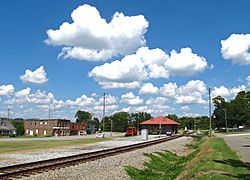Niota, Tennessee facts for kids
Quick facts for kids
Niota, Tennessee
|
|
|---|---|

Niota
|
|
| Nickname(s):
socktown
|
|

Location of Niota in McMinn County, Tennessee.
|
|
| Country | United States |
| State | Tennessee |
| County | McMinn |
| Settled | 1850s |
| Incorporated | 1911 |
| Named for | Ni-o-tah, a fictional Indian chief |
| Area | |
| • Total | 2.30 sq mi (5.95 km2) |
| • Land | 2.30 sq mi (5.95 km2) |
| • Water | 0.00 sq mi (0.00 km2) |
| Elevation | 1,007 ft (307 m) |
| Population
(2020)
|
|
| • Total | 772 |
| • Density | 335.94/sq mi (129.69/km2) |
| Time zone | UTC-5 (Eastern (EST)) |
| • Summer (DST) | UTC-4 (EDT) |
| ZIP code |
37826
|
| Area code(s) | 423 |
| FIPS code | 47-53380 |
| GNIS feature ID | 1648566 |
Niota is a city in McMinn County, Tennessee, United States. The population was estimated at 772 in 2020 by the U.S. Census Bureau.
History
The community was originally called "Mouse Creek," but was renamed in 1897 to avoid confusion with a railroad stop in Jefferson City that was named "Mossy Creek." The name "Niota" was based on the name of a fictional character in a dime novel, a Native American chief named "Nee-o-tah."
The Niota Depot, built in 1854 for the East Tennessee and Georgia Railroad, is the oldest standing railroad depot in Tennessee. It currently serves as Niota City Hall.
In 1988, a group of women, later dubbed the “Golden Girls of Niota”, led a successful city council election campaign and became one of the first all-female city councils in the United States and the only one at the time. The group ran as the People’s Choice Party and was led by 78-year old Mayor Effie Lones, the oldest elected female official in the country at the time of her election. Every member of the Golden Girls was a grandmother. 4 of the candidates were elected via write-in votes, and they handed out sample ballots prior to Election Day to familiarize voters with the write-in process.
Geography
Niota is located at 35°30′51″N 84°32′50″W / 35.51417°N 84.54722°W (35.514230, -84.547132). The city is situated along US Route 11 between Sweetwater and Athens. Tennessee State Route 309 connects the city with Interstate 75 to the west.
According to the United States Census Bureau, the city has a total area of 2.0 square miles (5.2 km2), all land.
Demographics
| Historical population | |||
|---|---|---|---|
| Census | Pop. | %± | |
| 1920 | 467 | — | |
| 1930 | 443 | −5.1% | |
| 1940 | 623 | 40.6% | |
| 1950 | 956 | 53.5% | |
| 1960 | 679 | −29.0% | |
| 1970 | 629 | −7.4% | |
| 1980 | 765 | 21.6% | |
| 1990 | 745 | −2.6% | |
| 2000 | 781 | 4.8% | |
| 2010 | 719 | −7.9% | |
| 2020 | 772 | 7.4% | |
| Sources: | |||
2020 census
| Race | Number | Percentage |
|---|---|---|
| White (non-Hispanic) | 677 | 87.69% |
| Black or African American (non-Hispanic) | 8 | 1.04% |
| Native American | 3 | 0.39% |
| Asian | 16 | 2.07% |
| Pacific Islander | 1 | 0.13% |
| Other/Mixed | 42 | 5.44% |
| Hispanic or Latino | 25 | 3.24% |
As of the 2020 United States census, there were 772 people, 390 households, and 255 families residing in the city.
Education
McMinn County Schools operates public schools, including Niota Elementary School.
Notable people
- Harry T. Burn, member of the Tennessee General Assembly, was born in Niota and lived in the community throughout his life. He is best remembered as the state legislator whose vote secured the ratification of the Nineteenth Amendment to the United States Constitution, giving U.S. women the right to vote.
- Alfred Cate, Tennessee state senator and Southern Unionist
See also
 In Spanish: Niota (Tennessee) para niños
In Spanish: Niota (Tennessee) para niños

